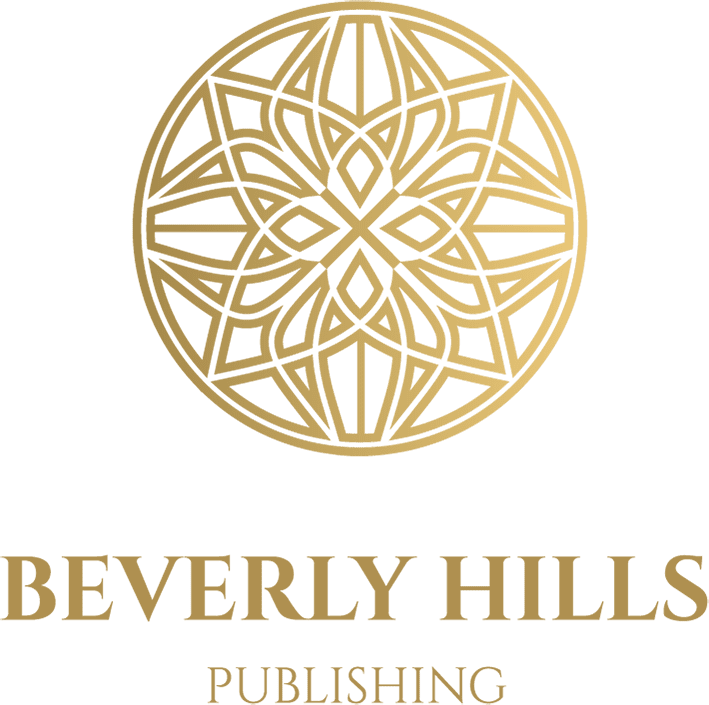In the competitive world of publishing, standing out is more important than ever. At Beverly Hills Publishing, we’ve seen firsthand how a strong author brand identity can make all the difference.
Your unique voice and story are powerful assets that can captivate readers and open doors to new opportunities. This post will guide you through the why and how of developing your author brand, setting you up for long-term success in your writing career.
Why Author Branding Matters
In today’s saturated book market, author branding isn’t just a nice-to-have-it’s essential for writers who want to thrive. A strong author brand can transform careers and open doors to numerous opportunities. Let’s explore the key reasons why author branding deserves your attention.
Building a Loyal Readership
A strong author brand creates a connection with readers that transcends a single book. When readers know what to expect from your work, they return for more. A study by BookBub reveals that 73% of their readers are interested in being alerted when their favorite authors publish a new book. This loyalty directly impacts sales and long-term success.
Standing Out in a Sea of Books
With millions of books published each year, differentiation is key. Your brand helps you carve out a unique space in readers’ minds. Stephen King’s brand, for example, is synonymous with horror, while Brené Brown is known for her work on vulnerability and courage. What’s your niche? A clear definition can attract the right readers and media attention.
Expanding Your Reach and Opportunities
A well-crafted author brand unlocks doors beyond book sales. Authors can secure speaking engagements, podcast appearances, and even lucrative brand partnerships based on their established identity. Financial author Dave Ramsey, for instance, has been helping people take control of their money and their lives since 1992 through his company Ramsey Solutions.
Enhancing Credibility and Authority
A strong brand positions you as an expert in your field. This increased credibility can lead to more media opportunities, higher speaking fees, and increased book sales. For non-fiction authors especially, a well-developed brand can establish you as a go-to authority in your niche.
Facilitating Marketing Efforts
When you have a clear brand, marketing becomes more focused and effective. You know your target audience, your unique selling points, and the best channels to reach your readers. This clarity saves time and resources in your promotional efforts.
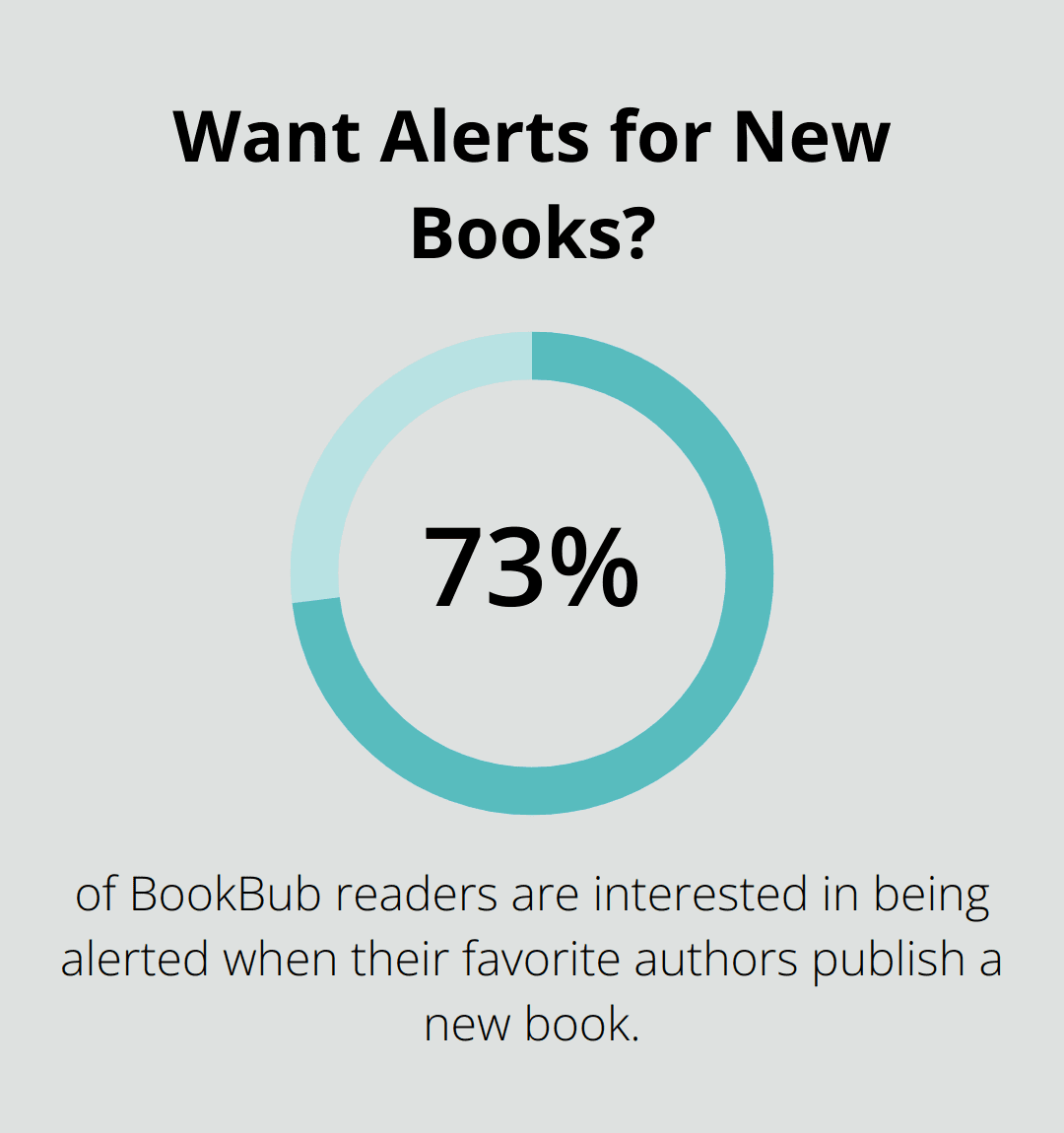
Your author brand is more than just a logo or a catchy tagline-it’s the total experience readers have with you and your work. As we move forward, we’ll explore the key elements that make up a strong author brand and how you can develop them effectively.
Building Your Author Brand Foundation
Crafting Your Unique Voice
Your writing style forms the cornerstone of your author brand. It distinguishes you from other writers in your genre. To develop a distinctive voice, read books in your genre, pay attention to reviews and feedback, and engage with readers on social media. This will give you a sense of what your audience is looking for and help you refine your voice consistently across all your work.
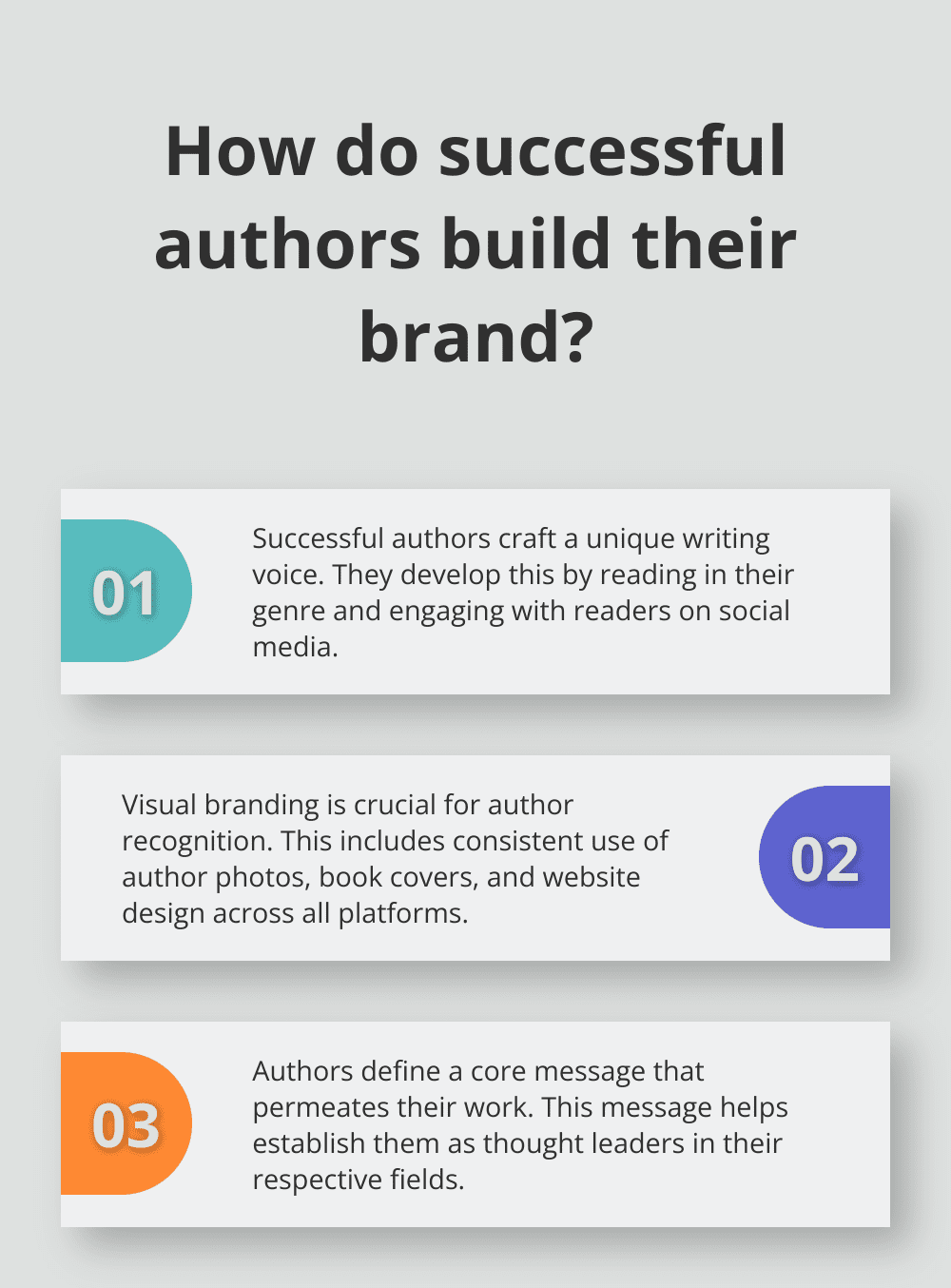
Thriller author Lee Child exemplifies this with his terse, action-packed writing style that perfectly complements his Jack Reacher series. This consistency in voice has helped him build a dedicated fanbase that knows exactly what to expect from his books.
Visual Branding That Speaks Volumes
Your visual identity often serves as the first point of contact between you and potential readers. This includes your author photo, book covers, website design, and social media aesthetics. Your aesthetic visually captures and communicates the essence of your brand. Whether it’s your logo, Pinterest graphics, or Instagram feed, they should create a cohesive look that reflects your genre and personality.
Author Joanna Penn uses a consistent color scheme and professional headshot across all her platforms. This visual consistency has helped her build a recognizable brand in the self-publishing and writing advice niche.
Defining Your Core Message
What do you want readers to associate with your name? Your core message should permeate everything you do. This could be a theme that runs through your books, a unique perspective you bring to your genre, or a particular value you want to share with your readers.
Non-fiction author Simon Sinek demonstrates this effectively. His core message of “Start With Why” infuses all his books, speeches, and social media content. This clarity has established him as a thought leader in leadership and business.
Consistency Across Platforms
Maintain a consistent brand image across all your platforms (social media, website, book covers). This consistency helps readers recognize your work instantly and builds trust. J.K. Rowling’s consistent branding across her adult fiction (written under the pseudonym Robert Galbraith) and her Harry Potter series showcases how an author can maintain a strong brand identity even when writing in different genres.
Evolving Your Brand
Your author brand should evolve as you grow as a writer. Stay true to your core values while remaining open to refinement based on reader feedback and industry trends. Stephen King’s brand, for instance, has evolved from purely horror to encompass a wider range of genres, all while maintaining his distinctive storytelling style.
As you build your author brand, consider partnering with a publishing company that understands the importance of branding. Beverly Hills Publishing™ specializes in helping authors craft compelling brand identities that resonate with their target audience. Their integrated approach ensures that your unique voice, visual identity, and core message work together to establish you as a leading authority in your field.
Practical Steps to Build Your Author Brand
Identify Your Ideal Reader
The first step in building your author brand is to understand who you want to reach. Create a detailed profile of your ideal reader, including their age, interests, reading habits, and book discovery methods. Use tools like Facebook Insights or Google Analytics to gather demographic data about your current audience. This information will guide your branding decisions and marketing strategies.
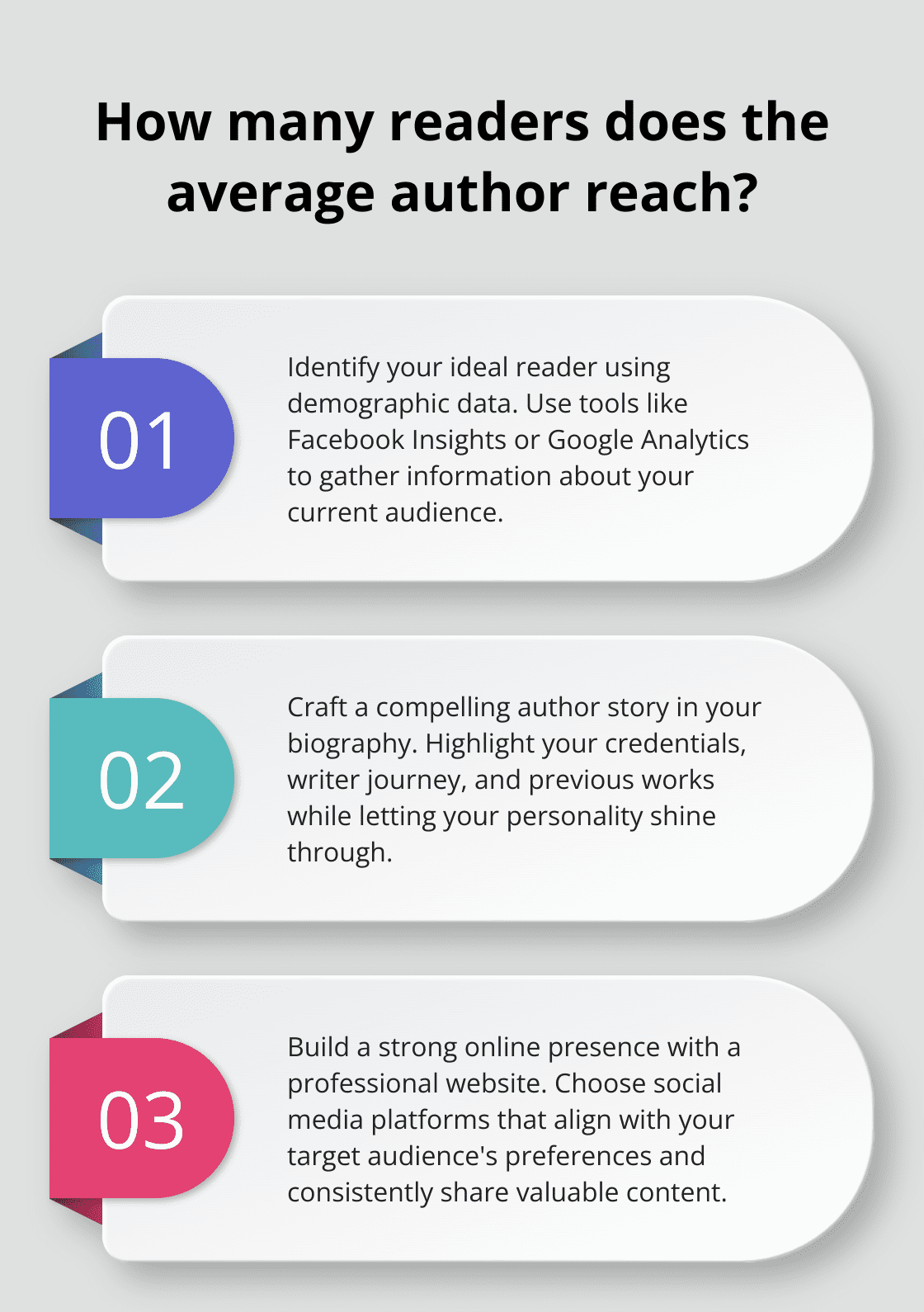
For example, if you write young adult fantasy, your ideal reader might be a 16-24 year old who enjoys cosplay, attends comic conventions, and is active on platforms like TikTok and Instagram. Tailor your brand to appeal to this specific audience to increase your chances of connecting with the right readers.
Craft a Compelling Author Story
Your author bio is more than just a list of accomplishments; it’s an opportunity to connect with readers on a personal level. An author biography briefly tells the reader everything they need to know about the author’s credentials, writer journey, and previous works. Be authentic and let your personality shine through.
Bestselling author Brené Brown does this exceptionally well. Her bio not only highlights her academic credentials but also shares her personal struggles and how they inform her work on vulnerability and courage. This transparency has helped her build a strong connection with her audience.
Build a Strong Online Presence
In today’s digital age, your online presence is often the first point of contact between you and potential readers. Start by creating a professional author website that showcases your books, blog posts, and upcoming events. Ensure your website design aligns with your brand aesthetics and is easy to navigate.
Choose social media platforms that align with your target audience’s preferences. Avoid linking to social media sites where you have an account, but don’t engage or actively post. Consistently share content that provides value to your audience, whether it’s writing tips, behind-the-scenes glimpses of your writing process, or industry insights.
Engage Authentically with Your Audience
Building a loyal readership requires more than just promoting your books. Engage with your audience regularly through social media, email newsletters, and in-person events. Respond to comments and messages promptly, and show genuine interest in your readers’ opinions and experiences.
Author Neil Gaiman excels at this, regularly interacting with fans on Twitter and sharing personal anecdotes that make readers feel connected to him beyond his books. This level of engagement has helped him maintain a dedicated fanbase across multiple genres.
Collaborate with Other Authors
Partnering with other authors in your genre can expand your reach and introduce you to new readers. Consider co-authoring a book, participating in joint promotions, or guest posting on each other’s blogs. These collaborations can provide fresh perspectives and help you tap into established audiences.
(For example, thriller authors often team up for boxed sets or anthologies, which can introduce their work to a wider readership.)
Building your author brand is an ongoing process that requires patience and persistence. As you implement these strategies, continually assess what’s working and be willing to adjust your approach based on feedback and results. With time and effort, you’ll develop a strong, authentic brand that resonates with readers and sets the foundation for long-term success in your writing career.
Final Thoughts
A strong author brand identity sets you apart in the crowded literary market. It fosters reader loyalty and opens doors to new opportunities in your writing career. Your unique voice, visual identity, and values form the core of your author brand, creating a memorable experience for your readers.
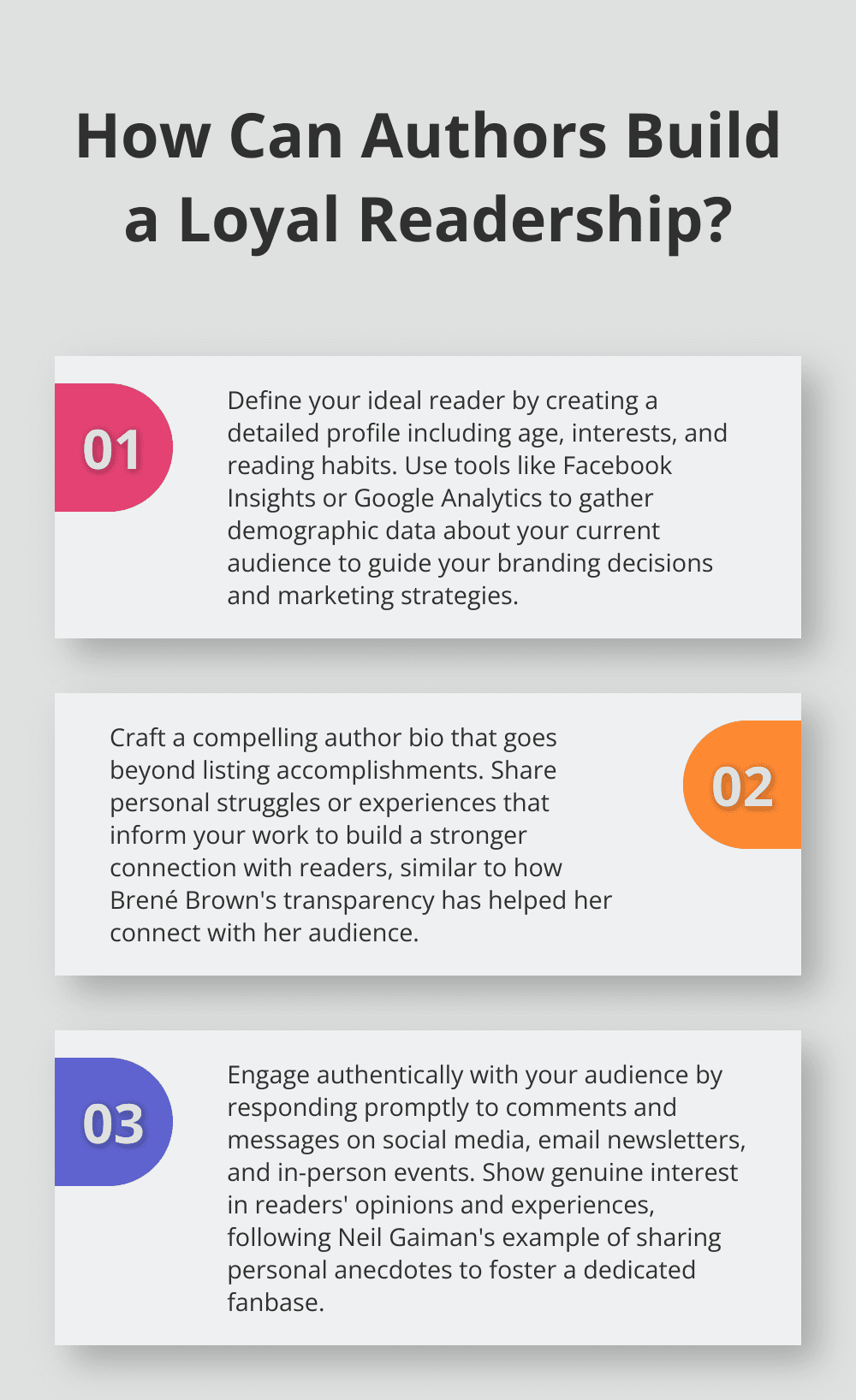
Define your target audience, craft your compelling author story, and establish a robust online presence to build your brand. Engage authentically with your readers and collaborate with other authors to expand your reach. These steps will help you stand out and connect with your ideal audience.
For authors who want to elevate their brand, Beverly Hills Publishing offers innovative strategies to establish authority in your field. Their approach combines publishing expertise with targeted branding and marketing (which can significantly boost your visibility). Take the first step today to develop your author brand identity-your future readers await your unique vision.















































































































































































































































